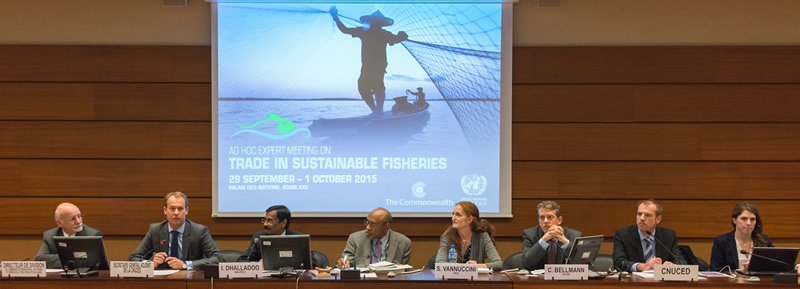UNCTAD and the Commonwealth Secretariat gather leading experts to discuss options to further advance trade in sustainable fisheries.
A gathering of leading experts in sustainable fisheries met in Geneva on 29 September, the first meeting at this level since world leaders signed up to the aim of conserving life under the sea and using oceans, seas and marine resources sustainably by adopting Goal 14 of the Sustainable Development Goals.
UNCTAD Deputy Secretary-General, Mr. Reiter, emphasized the importance of oceans and ocean resources, like fish, for livelihoods of population, especially in developing countries. He stressed that "We can do much for fish conservation and trade but we have no luxury of time; time has run out, now we need concrete and strong actions to stop the depletion of fish."
Fisheries, if sustainably managed, have the potential to become one of the main contributors towards poverty reduction and food security, especially in developing countries. According to the World Bank, around 350 million jobs are linked to fisheries, port management and related activities1 and the livelihoods of 10-12 percent of the global population depend on the sector.

Fish is also one of the most traded food commodities worldwide. It represents about 10 percent of all agricultural exports and 1 percent of all merchandise trade in value terms. The importance of trade in fish and fish products has been steadily increasing in the past two decades. World trade flows in fish and fish products reached $264 billion in 2013, a 76 percent more in terms of trade value than the amount traded in 1995. Developing countries are the main exporters of fish (56 percent), while developed countries account for approximately 69 percent of global imports.
However, instead of protecting and ensuring the sustainability of this valuable resource, the fisheries sector is being threatened on many levels, including by an over-exploitation of its resources, destructive fishing practices, ecosystem degradation and declining biodiversity, climate change, ocean acidification and pollution. Currently, 87 percent of the world's marine fish stocks are fully exploited, overexploited or depleted. In addition, the consumption of fish is growing as population expands at an increased rate, adding to the stress endured.
The Food and Agriculture Organization of the United Nations estimates that rebuilding overfished stocks could increase production by 16.5 million tons and annual rent by $32 billion. The benefits of re-building fisheries in general outweigh the costs.
Despite national, regional and multilateral efforts in the past 20 years, the attempts made still seem insufficient to reverse the decline of global fish stocks.
At the Geneva expert meeting, Mr. Deodat Maharaj, Deputy Secretary-General of the Commonwealth Secretariat, said that: "The achievement of targets such as the end of overfishing and destructive fishing practices and the implementation of science-based management plans to restore fish stocks by 2020 will be extremely difficult to achieve without coherent global action."
UNCTAD and the Commonwealth Secretariat convened governments, international experts, businesses and other relevant stakeholders to discuss and identify possible approaches and options within the trade policy toolbox to mainstream sustainable fishing practices.



